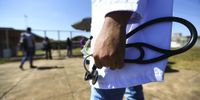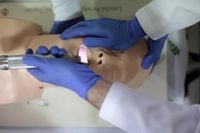In a significant assessment of medical education in Brazil, the National Student Performance Exam (Enade) has revealed that only six out of 309 evaluated medical courses achieved the highest grade of 5 in 2023. This result, released on April 11, 2025, shows a stark contrast in performance among institutions, with five of the top-rated courses located in São Paulo and one in Minas Gerais.
The sole public institution to receive this accolade is the Faculdade de Medicina de São José do Rio Preto (Famerp), while the five private institutions include Universidade do Oeste Paulista (Unoeste/SP), Faculdade de Ciências Médicas da Santa Casa de São Paulo (FCMSCSP/SP), Centro Universitário Governador Ozanam Coelho (UNIFAGOC/MG), Faculdade Israelita de Ciências da Saúde Albert Einstein (FICSAE/SP), and Centro Universitário Católico Salesiano Auxilium (UniSalesiano/SP).
In total, 9,812 courses across various disciplines were evaluated by the Ministry of Education (MEC) in this cycle, with only 66 institutions achieving the maximum grade of 5 across all areas, representing just 3.2% of the total assessed. The results were presented during a live broadcast by the National Institute of Educational Studies and Research Anísio Teixeira (Inep).
Out of the 2,048 higher education institutions evaluated, 33 were public and 33 private, with São Paulo leading with 19 institutions rated highly. Notably, the majority of institutions that received grades of 4 and 5 were concentrated in the southeastern region of Brazil.
While some courses excelled, the data also highlighted that 27.3% of medical courses in private colleges received low grades of 1 and 2, compared to just 6% in public universities. This discrepancy raises concerns about the quality of education in private institutions, which have seen a significant increase in the number of medical programs in recent years, partly due to the Mais Médicos program aimed at expanding healthcare access in underserved areas.
According to the MEC, the final grades for the courses are based on several factors, including student performance in the Enade, the quality of faculty, infrastructure, and didactic resources. In this evaluation, 119 courses received a grade of 4, while 156 courses were rated 3, indicating a regular performance. Furthermore, 22 courses scored a 2, and two received a grade of 1.
In terms of performance, the health and well-being area had the highest average score, with medicine scoring 65 and physiotherapy 53.67 on a scale of 0 to 100. Other disciplines such as architecture and urbanism, environmental engineering, and occupational safety also showed commendable results.
Despite the high stakes, the Enade has faced criticism over the years. A 2019 study by the Organization for Economic Cooperation and Development (OECD) pointed out the exam's flaws, noting that it often assesses generic skills rather than specific competencies required in various fields.
Ulysses Teixeira, the director of higher education assessment at Inep, mentioned during the presentation of the results that there are plans to revise the evaluation model for medical courses. He emphasized the need for a more rigorous assessment of practical training and the content covered in the six-year medical curriculum.
Amidst these evaluations, the MEC has also expressed a commitment to enhancing the regulatory framework for private higher education, which accounts for nearly 80% of student enrollments in Brazil. Minister Camilo Santana has indicated that a new regulatory body will be established to oversee the quality and pricing of education in private colleges, particularly in light of the rising costs of medical education.
In recent years, private institutions have faced scrutiny for the high tuition fees they charge, which can reach alarming levels. The government aims to investigate the factors contributing to these costs and ensure that students are not subjected to abusive pricing practices.
In addition to the ongoing evaluations, the MEC has previously suspended the approval of new medical courses for five years, citing the need to maintain quality standards in medical education. However, some institutions have challenged this suspension legally, leading to the creation of new medical programs without proper authorization.
As the landscape of medical education evolves, the balance between expanding access to training and maintaining high-quality standards remains a critical issue. The recent Enade results serve as both a benchmark for success and a call to action for institutions to improve their educational offerings.
Looking ahead, there is a clear need for continuous assessment and reform in the way medical education is delivered in Brazil. With the government poised to implement changes in evaluation methods and regulatory measures, the future of medical training in the country could see significant shifts aimed at enhancing the quality of education and, ultimately, the healthcare system.







